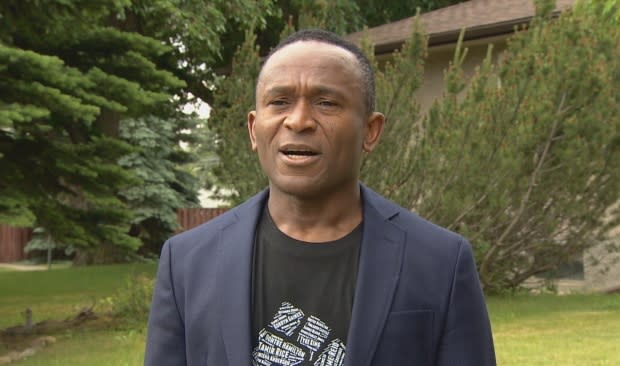'A lack of political bravery': Edmonton council's police motion falls flat, experts say
Calls for dramatic changes to policing in Edmonton in the past few weeks fell mainly on deaf ears, two university professors told CBC News Tuesday.
Monday, council approved a multi-part motion, which included taking out $11 million of the police budget over the next two years.
University of Alberta associate law professor, Ubaka Ogbogu, said that move doesn't go nearly far enough.
"It's a lack of political bravery," Ogbogu told CBC News Tuesday. "I think council, quite frankly, has failed all the activists and members of the community who made very clear demands supported by evidence as to what council should do."
The city's estimated budget for police in 2021 was $389 million — up from this year's $373 million, which ultimately means it's not a cut, Ogbogu noted.
"You need your first step to be something that is deep, is incisive, gives a clear signal that you understand the philosophy that's driving the demand to defund the police."

Ogbogu was one of nearly 150 people who addressed council directly during the public hearing that spanned several days starting on June 15.
Temitope Oriola, associate professor of sociology at the University of Alberta, agreed council's motion following presentations at the public hearing is disappointing.
"At best, it represents a tepid response," Oriola told CBC News Tuesday. "It draws on a familiar and historically well-used playbook, which is an excess of inquiries and boards and panels and so forth to examine or study what has already been studied to death."
Oriola, who spoke during a demonstration at the legislature June 5, is referring to council's decision to create a task force to address the issues.
"Every member of the public has the right to be skeptical any time a government, in response to a major existential crisis, responds with some kind of inquiry."
Several councillors said they believe the most important part of the motion is creating a community safety and well-being task force.
City council is asking administration to report back in August with terms of reference and bylaw for the task force.
Coun. Aaron Paquette said there is still a lot of learning to do and society must have the courage to make changes.
"What we've heard from the community, they're ready and willing," Paquette said Monday. "From what we've seen on council, there is some of that as well."
Police Chief Dale McFee said he supports a task force involving social agencies.
"When you get across multiple service providers and you stop worrying about who's paying the bill and that you're all measured on the same sort of outcomes, you can move mountains quickly," McFee said during a news conference Monday.
"It's never been done before, why? Because it's hard, but it starts with using seed money to plant it."
Ogbogu said he thinks the task force is a waste of time.
"I'm worried that this task force is going to be made up of members of the police and members of the community, including people who are not affected by police actions, he said.
"By the end of the day they're going to come up with something that I don't think is going to represent the heart of what activists want and what the community wants."
Oriola insists the mayor and council can take a number of steps right away to transform the Edmonton Police Service, like putting an end to carding, which often targets Black and Indigenous people.
"We do not need a panel of citizens to do that."
Oriola is calling for higher standards when recruiting police members, targeting university-educated people.
"A Grade 12 level of education is no longer sufficient for 21st century policing."
Currently, police have minimum entry qualifications, Oriola noted, and poor gender and ethnic composition, elements council has the ability to change immediately as well.
@natashariebe

